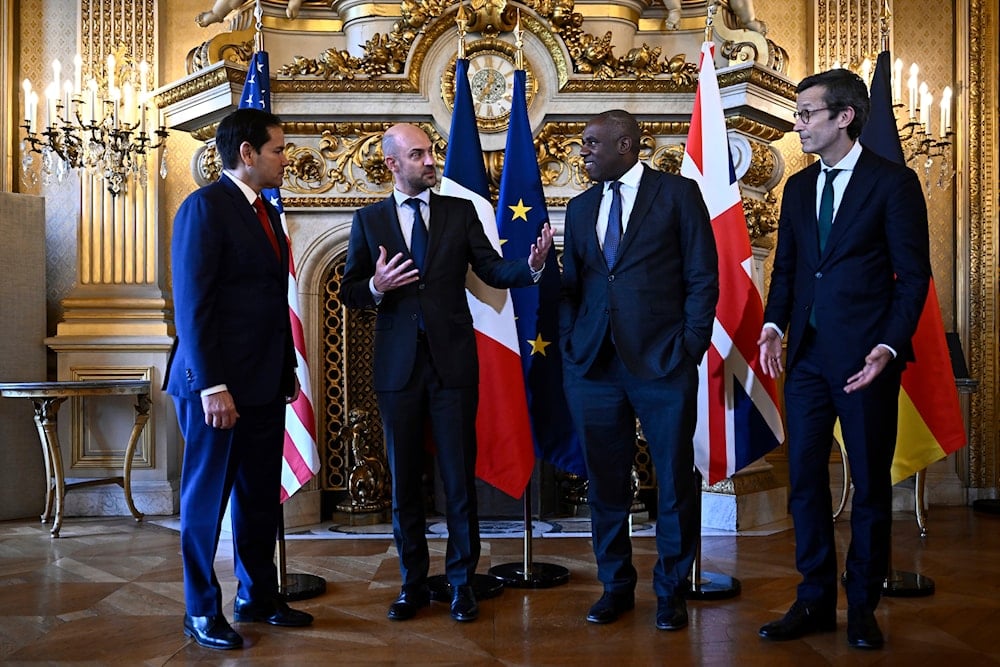UN sanctions on Iran snap back after nuclear talks collapse
The E3 announces the reimposition of sweeping sanctions on Iran after nuclear talks collapsed, with Marco Rubio calling it “decisive global leadership.”
-

Germany's Political Director of the Ministry of Foreign Affairs Gunter Sautter, right, French Foreign Minister Jean-Noel Barrot, second left, Britain's Foreign Secretary David Lammy, second right, and United States Secretary of State Marco Rubio prepare to pose before high-level talks to discuss Ukraine and its security, in Paris, France, on April 17, 2025. (Pool via AP)
Widespread United Nations sanctions against Iran have returned into force for the first time in a decade, following the collapse of last-ditch nuclear negotiations and a failed attempt by Russia and China to delay the measures.
The restrictions, which took effect late on September 27, were triggered under the “snapback” mechanism of UN Security Council Resolution 2231 after France, Germany, and the United Kingdom (E3) claimed that Iran was in “persistent and significant non-performance” of its nuclear commitments.
The sanctions bar dealings related to Iran’s nuclear and ballistic missile program, reimpose conventional arms embargoes, and reinstate travel bans and asset freezes on listed individuals and entities.
Rubio: Clear message to Tehran
US Secretary of State Marco Rubio welcomed the reimposition, calling it “an act of decisive global leadership on the part of France, Germany, and the United Kingdom.”
Rubio said the restored resolutions “address the threats posed by Iran’s nuclear, ballistic missile, conventional arms, and destabilizing activities,” stressing that they “require Iran to suspend uranium enrichment-, heavy water-, and reprocessing-related activities; prohibit Iran from using ballistic missile technology; embargo the export of conventional arms to Iran; reimpose travel bans and global asset freezes on listed individuals and entities; and authorize the seizure of weapons and other prohibited cargo being transferred by Iran.”
He said that these sanctions send “a clear message: the world will not acquiesce to threats and half measures – and Tehran will be held to account.”
Yet, Rubio said that Washington remains open to diplomacy.
“President Trump has been clear that diplomacy is still an option—a deal remains the best outcome for the Iranian people and the world,” Rubio said.
“For that to happen, Iran must accept direct talks, held in good faith, without stalling or obfuscation,” he added.
Read more: Iran criticizes Europe’s snapback move as 'politically destructive'
E3: No justification for HEU stockpile
In a joint statement, the E3 foreign ministers stated that their objective “remains that Iran shall never seek, acquire or develop a nuclear weapon.”
They stressed that the sanctions’ restoration was a measure of last resort, triggered because “Iran repeatedly breached these commitments” under the Joint Comprehensive Plan of Action (JCPOA).
However, Iran had remained compliant with the clauses of the JCPOA up until the US unilaterally withdrew from the agreement on May 8, 2018.
According to the E3, the International Atomic Energy Agency (IAEA) reported that Iran now holds “a quantity of enriched uranium which is 48 times the JCPOA limit.” The statement warned that “this includes 10 ‘Significant Quantities’ of High Enriched Uranium (HEU) – 10 times the approximate amount of nuclear material for which the possibility of manufacturing a nuclear explosive device cannot be excluded.”
Meanwhile, Tehran maintains that it does not intend to produce nuclear weapons, even after its nuclear facilities were targeted and damaged by Israeli and American strikes.
Despite triggering snapback, the E3 insisted diplomacy is not over.
“The reimposition of UN sanctions is not the end of diplomacy,” they stated.
Read more: Lavrov blasts E3 for sabotaging Iran nuclear talks, fueling sanctions
Iran rejects West's demands
Iranian President Masoud Pezeshkian has rejected U.S. proposals that Tehran surrender its enriched uranium stockpile in exchange for a short reprieve from sanctions, calling the offer “unacceptable.”

 3 Min Read
3 Min Read








